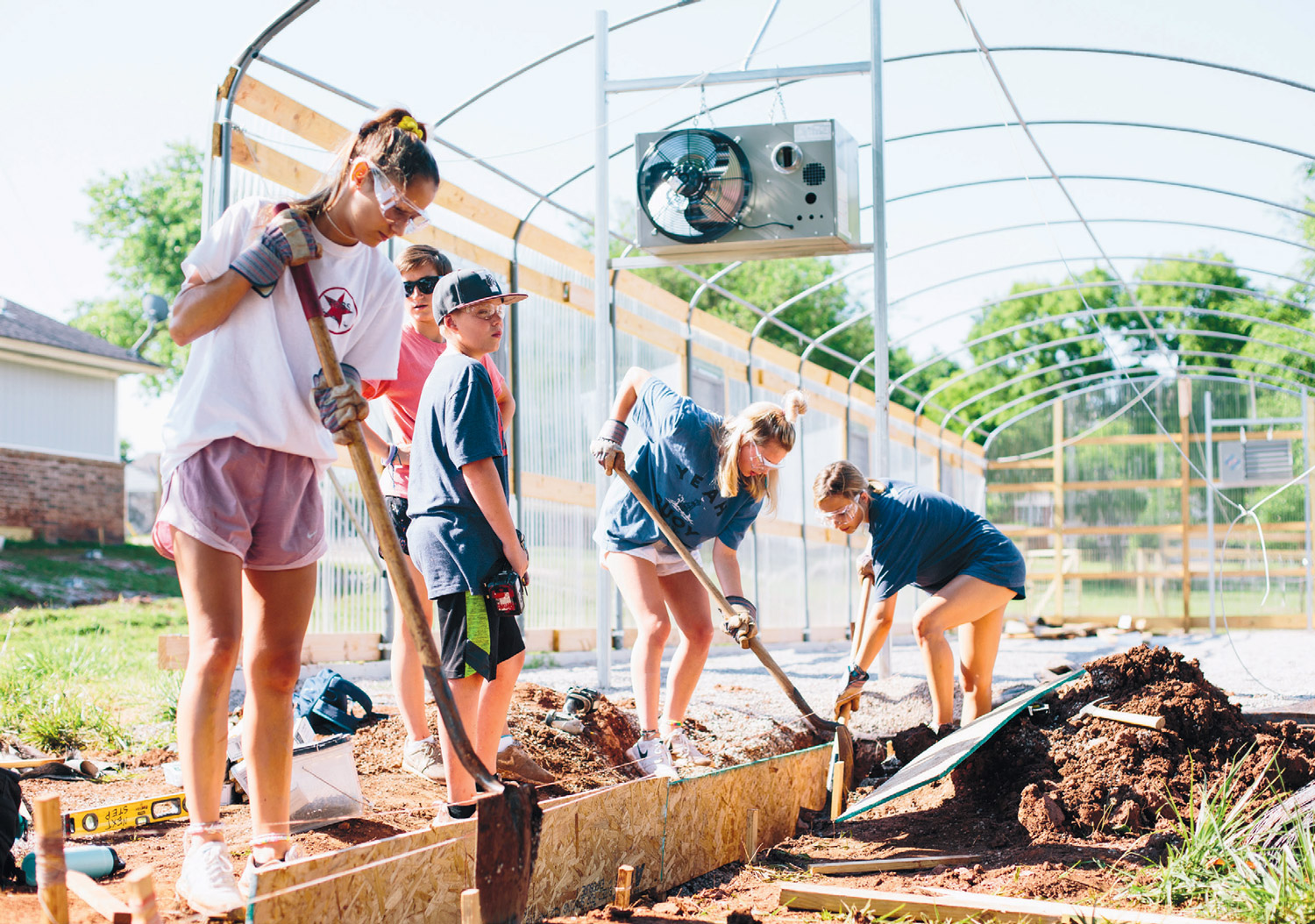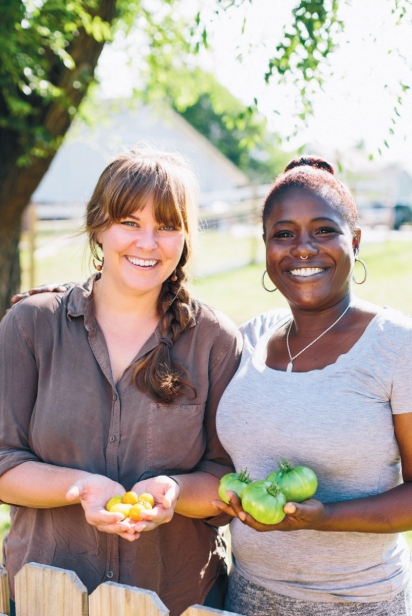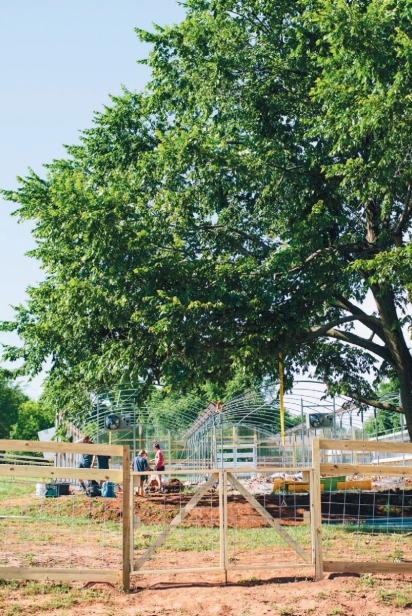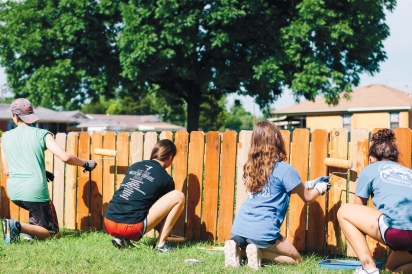Freedom Farms & Greenhouse
“Literally everyone on the planet eats. If you want to get to know your neighbor, grow some food with them,” says Freedom Farms Board Member Micah Anderson.
And, that is the distilled version of Ann Fleener’s philosophy as the Director of Freedom Farms & Greenhouse, which is a branch of the local non-profit RestoreOKC.
“RestoreOKC started about three years ago out of a desire to partner with our community to see the beauty, wisdom and leadership of neighbors brought to full expression so that northeast OKC isn't defined by cycles of poverty but by the ingenuity and grit that we see every day. We believe people can break cycles and be changed forever,” Ann explains. “We are a joint effort from many churches from the northeast and northwest side who are coming together with the goal of getting to know our neighbors, and listening to what people really want and need.”
After starting out of the library on the northeast side of Oklahoma City to learn the needs of the community, it became quickly apparent that they were sitting on one of the biggest food deserts in the city. With only one grocery store to service a community that has been trapped in generations of poverty, RestoreOKC began working on solutions to help combat hunger that would make neighbors the stakeholders.
Initially, they began a program at Thelma R. Parks Elementary School, which has now expanded to include Martin Luther King Elementary as well. They provided support and resources for teachers, snacks for students, and backpacks of food for the weekend by partnering with the Regional Food Bank.
Last spring, Restore OKC started planting vegetable gardens at those schools, with each classroom getting a 4’x4’ plot of land where the students get to plant, maintain, and eventually eat produce that they’ve grown themselves. Aside from gardening lessons, children are provided with the opportunity to learn about the natural world around them as well, with classes such as an insect safari where the kids get lessons on different kinds of little garden critters and then go look for them in their gardens.
“It was just the coolest thing to see kids who maybe hours before were like, ‘Ahhh, it’s a spider!’ instead have a little magnifying glass and be just fascinated by it now, and knowing it’s an arachnid, not an insect,” Ann grins.
Her background was a natural fit for these goals of RestoreOKC. Growing up in a small town in Kentucky, her parents and grandparents were gardeners. When she went to college, she initially was studying business, but a summer job at a landscaping company was enough to make her change her major. Ann graduated with a master’s degree and eventually a PhD in horticulture, with much of her studies involving education as well.
Five years ago, Ann moved to Oklahoma, taking on the role as Director of Education for the Myriad Gardens in downtown Oklahoma City before joining the RestoreOKC team last year. Since then, she’s directed the growth of the non-profit's most ambitious project yet: Freedom Farms.
Freedom Farms not only encompasses the elementary gardens, but now has a larger scope which includes community gardens & greenhousing as a job-training opportunity in partnership with Langston University. In a historic neighborhood pocketed in the northeast side lies their headquarters. What was formerly the Joy Missionary Baptist Church, a quaint old building with colorful stained glass windows and high ceilings, is now their central office. It’s an interesting building, but what’s happening outside is more compelling.
On the surrounding acreage, Freedom Farms has huge plans. Out front is an orchard that is growing which will comprise their "edible acre." They’ve cooperated with Julia Laughlin from OSU to select a hearty blend of native fruit trees and other varieties that are suited to the climate’s wild weather swings. There will be persimmons, pawpaws, sand plums, and other trees. This orchard will be available to the community to come and pick fruit for free.
Similarly, Freedom Farms is also cultivating a community garden to grow leafy greens and vegetables that will also be harvested and given to any residents of the area who are in need of fresh produce. Many people in the neighborhood are elderly, on public assistance, or don’t have the means to make it the the grocery store frequently, so this will provide free and healthy food to those who are in need. Partnership with the Northeast Farmer's Market will take SNAP in an effort to demonstrate the viability of a full grocer to serve the Northeast Oklahoma City community.
The largest and most ambitious project that Freedom Farms currently has going is a state-of-the-art aquaponic greenhouse that will employ students from the community. With partnership from Langston University, local high schoolers can learn how to grow food and have the potential to earn money and school credits along the way resulting in higher-education opportunities on scholarship.
“There’s a great thrill in knowing how to grow your own food, and a security in being able to do that as well,” Freedom Farms Manager Keisha Scott enthuses. “There’s something fascinating about being able to take something and call it yours, and start it from what feels like nothing, a tiny seed you hold in your hand, and turn it into something potentially huge that’s going to feed you and other people.”
There are more benefits than learning the responsibility and stewardship of caring for your community’s food, however.
“There’s all these amazing studies now that tell us being in nature, interacting with nature, and especially doing things like growing our own food, benefits us psychologically,” Ann says. “It actually lowers your stress levels, it can lower your blood pressure, it helps you be able to focus more. There’s so many benefits we get from doing that.”
As things progress, Freedom Farms Manager & Langston's Agriculture Tech Keisha Scott intends to really incorporate her passion for animals like fish, chickens, and goats into a myriad of other possibilities for programs and education. This could mean things like culinary arts and soapmaking, in addition to the greenhouse management and agricultural education that students are already receiving. Everything will be grown as close to organic standards as possible, passing on the important responsibility of making sure the planet is being stewarded well.
As Ann succinctly notes in an alternate phrasing of her philosophy, “Our goal with the whole farm is to get to know our neighbors, to partner with them to create a better future for all of us.”







